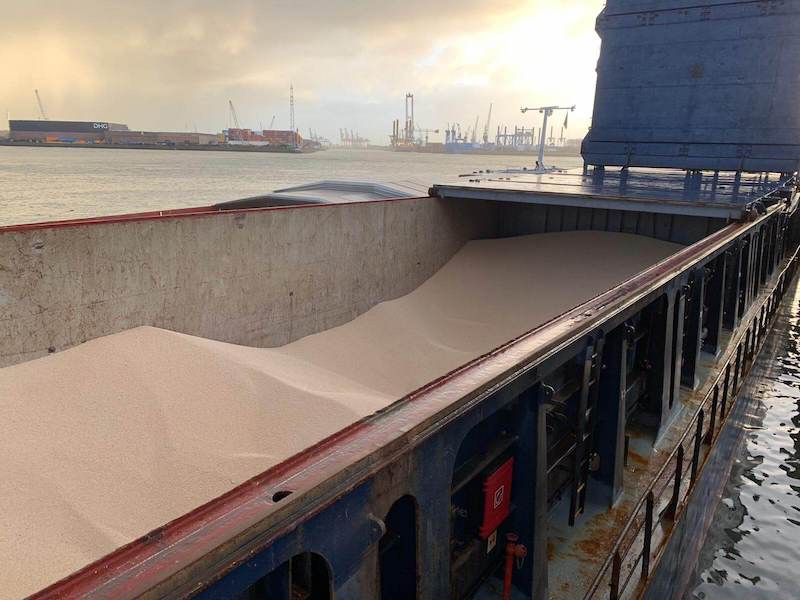Europe’s inland waterways are an economical transport option the full potential of which has not been exploited yet by companies, as explains Tarptautines logistikos centras /TLC, your Pangea partner in Lithuania.
Recently, TLC completed an unconventional order – carried 2,340 tons of organic peas by barge over Dutch rivers. Loose peas were transported from Klaipėda to the port of Rotterdam by ship, and in Rotterdam they were trans shipped to a barge, which transported them for almost another 200 km by various rivers and canals to the city of Mepel in the Netherlands.
From ship – to barge
“This is an extraordinary project, when we included cargo transportation over inland waters by barge in the logistics chain. Everything went successfully, although we had to transship the cargo many times, we were dependent on the weather conditions, different equipment, and we were under pressure due to the busy schedule. However, we already have another such order for the spring, so the work experience will be useful”, says Justas Kairys, the director of Tarptautinės Logistikos Centras.

The price may be lower
One of the reasons for choosing such an environmental friendly pea transportation method is that it was demanded by a customer who sought to comply with the GMP + standard of good manufacturing practice. However, this mode of transportation also allowed to save, as it was cheaper than transporting peas by truck or rail.
“By transporting such cargo by ships by sea and inland waters, we can save about 10-15 Eur/t of logistics costs, if we count the entire route from Klaipėda port to the buyer’s warehouse. Of course, the price always depends on the time of year, the occupancy of the ships at that time, as well as whether the terminals need to work during the holidays when trans shipping the cargo” , notes J. Kairys.
He also reminds that prices are determined by quantity as well. According to him, it is worth to start thinking about transportation by ships and barges if the cargo is more than 2500 tons.
It is possible to jointly transport individual cargoes on ships
“When trying to save the costs of transportation, bulk cargo can be combined at Klaipėda port and transported by ship to Rotterdam, and there the cargo can be distributed and delivered by different barges over inland waters to different addressees”, says the specialist.
In many Western countries, rivers are already adapted for the transport of goods by water. You can also choose barges of various sizes – from 500 tons to 3,000 tons.
Cargo is trans shipped from barges to trucks and the most polluting road transport transports it to the warehouse only a short distance.
“In our case, peas were delivered to Klaipėda by rail, trans shipped from railcars to ship, from ship to barge, and from barge to 15 trucks, which transported peas to the buyer’s warehouse. It was not easy to ensure that this entire chain would work smoothly, because it had many participants and various nuances, such as unfavorable weather for the transshipment of dry peas in the open field, or failures of ships and handling equipment. However, we already have experience, contacts, and we also believe that other cargoes will be easier to transport by inland waterways”, says the head of Tarptautinės Logistikos Centras.
Cargo will also travel by Nemunas
There are 911.1 km of inland waterways in Lithuania. The main inland waterway of national significance is Nemunas River running from Kaunas Cargo Pier to Atmata River estuary (215 km) and the Curonian Lagoon (64.5 km).
On 9 December 2020, the SE Inland Waterways Directorate signed a funding agreement for the project “Modernization of the TEN-T network road E41” and secured a funding of over 23 million euros from EU funds for adapting the section of Nemunas from Kaunas to Klaipėda for cargo transportation. According to the data of the Directorate, it is estimated that 357 thousand tons would be transported by Nemunas, and later – 427 thousand tons of cargo per year. This cargo flow would be achieved gradually from 2023 until 2028-2030.
According to the European Commission, the energy consumption of inland waterway transport per tonne-kilometer of transported cargo requires about 17% of road transport and 50% of rail transport energy. In addition, inland water transport is safe, which is important for the transport of dangerous cargoes.
Lithuanian companies are increasingly looking for ways to ensure the environmental friendliness not only of the product itself, but also of the entire supply chain – so that the delivery of goods would be environmentally friendly as well. Logistics companies only begin to accumulate such experience, however, J. Kairys points out that ecological transportation of cargo can also save a lot.
Pls. visit https://www.tlclogistics.lt/ for more information